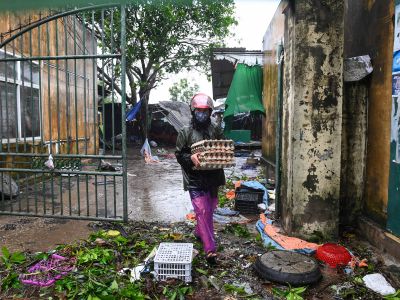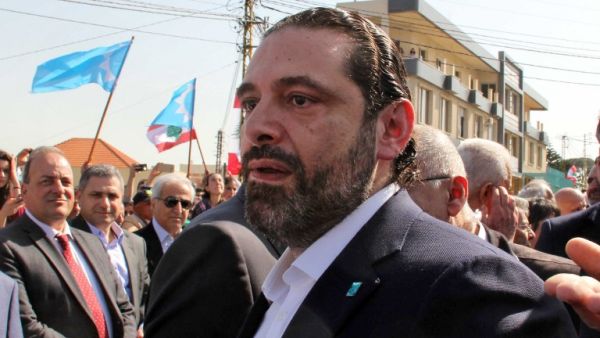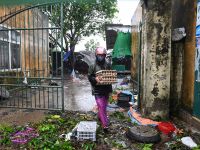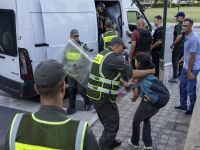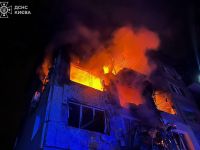Prime Minister Saad Hariri urged voters Thursday to elect politicians who make the interest of Lebanon prevail over the interests of sects and parties, saying the outcome of the upcoming parliamentary elections was crucial to the fate of economic revival.
After heading Thursday’s Cabinet session, Prime Minister Saad Hariri continued his electoral campaigning with a visit to the Chouf district of Iqlim al-Kharroub, which culminated in a rally at the town of Barja, attended by thousands of Future Movement supporters.
“We have an ambitious Capital Investment Program that opens the door to thousands of job opportunities,” Hariri told the crowd. “In order for this program to work, it needs a political team that makes the interest of the country prevail over the interests of sects and parties. We choose the interest of the country, and we need a majority in Parliament to go ahead with this choice.”
Hariri was accompanied by the Future Movement’s two candidates for the area. List allies from the Progressive Socialist Party were noticeably missing.
The PSP and its leader MP Walid Jumblatt have recently been critical of Hariri, especially after he went on a tour with PSP rival, Minister of Displaced Talal Arslan, to Hasbaya.
At the time, PSP MP Wael Abu Faour said that the door to Hasbaya was “through Walid Jumblatt,” in a clear reference to the party’s displeasure at the snub.
- UK Ambassador Visits Hariri, Explains British Participation In Syria Strike
- Aoun: Accountability, Fighting Corruption Essential For Lebanese Democracy
Thursday, the PSP’s senior media officer Rami Rayess was quoted by LBCI as saying that “there is either a complete political partnership or none at all,” when discussing the reasons for PSP’s absence from Hariri’s tour. Rayess added that a number of decisions taken independently by the Future Movement, such as insisting on certain candidates or “inappropriately” replacing PSP-affiliated MP Antoine Saad on the West Bekaa-Rashaya list, “do not help strengthen the political partnership.”
Earlier in the day, the PSP released a statement confirming that there was no coordination between the parties and that its candidate Teymour Jumblatt would not participate in Hariri’s tour.
During his visit, Hariri admitted that there were disagreements with the Jumblatts but that they would not hamper the relationship with the Druze leader or his party.
“With Walid Beik and Teymour we will continue the path. We will always cooperate with Teymour. Surely there will be bickering, but it is acceptable from Walid Beik,” Hariri said speaking to residents of the area. Hariri said: “This is a journey that we will complete together, God willing ... [the town has] loyalty to Rafik Hariri and Saad Hariri, and it will express its loyalty on May 6 at the ballot box.”
The premier dubbed the elections as a march for his slain father “who sacrificed himself to protect you and protect Lebanon, and I will continue on his path.”
He admitted that local residents had the right to be disappointed with the state. Hariri said certain problems shouldn’t be postponed. “The random waste dumps and the waste mountain between Jadra and Barja, on a highway that does not see the light, are problems that the state should solve,” Hariri admitted.
- PM Hariri Calls On Beirutis To Raise Voter Turnout To Maximum Level In Coming Poll
- Hariri Lashes Out At Hezbollah Leader For Failing 'Dissociation Policy' On Regional Conflicts
Meanwhile, Speaker Nabih Berri said in an interview published Friday that Lebanon was experiencing an unprecedented period of national unity over the sovereignty of land, sea and resources.
In the interview with the Iranian state Islamic Republic News Agency, the speaker also said that the issue of Jerusalem could be used as a catalyst to spark a much-needed dialogue between Iran and Saudi Arabia.
“Dialogue ... between the Islamic Republic of Iran and Saudi Arabia, is an urgent necessity,” Berri said, according to highlights of the interview released by his office Thursday. “The opportunity is now [and there is] more than one [channel] to open dialogue, and let the gate [to dialogue] be Jerusalem and work to save it from the clutches of Judaization.”
As for Lebanon’s potential oil reserves, Berri said all political parties are “united over not allowing any rights of Lebanon to be violated, especially in regards to oil and gas, including the land borders.” Berri was referring to the daily Israeli violations over Lebanon’s air, land and sea borders. The Jewish state is currently building a cement wall along Lebanon’s southern border close to a number of disputed points. A Lebanese Army source told The Daily that the construction has not yet encroached on any of contentious locations.
Earlier this year, the Israeli Defense Minister Avigdor Lieberman claimed that Lebanon’s demarked southern oil exploration block was “very provocative.” This immediately led to meetings between Lebanese leaders who took a unified stance to uphold Lebanon’s rights. The first exploratory drilling in Block 9, part of which falls in disputed waters, is set to take place in 2019.
Turning to his Amal Movement’s relationship with Hezbollah, Berri said the alliance is solid and not just “a sectarian matter.” Rather, he said that “it is based on principles that were announced by [Hezbollah Secretary-General] Sayyed Hasan Nasrallah.”
These principles include facing “Israeli aggression, the fight against corruption and the commitment to the resistance,” as well as a mutual stance on relations with Arab and regional countries, he said.
Separately, President Michel Aoun thanked his French counterpart Emmanuel Macron for hosting the CEDRE conference, adding that the total $11 billion pledged to Lebanon would not be beneficial unless accompanied by necessary reforms. “Lebanon’s renewed advancement will not happen unless there are direly needed economic, fiscal and social reforms,” Aoun was quoted as saying by a statement from his office.
The president expressed gratitude to Macron “for his efforts to make the CEDRE conference a success” and for France’s financial contribution during the one-day event on April 6, which was aimed at gathering international support for Lebanon’s economy and infrastructure. France was the top donor at CEDRE, pledging a total of $673 million in soft loans and grants to Lebanon.
This article has been adapted from its original source.


